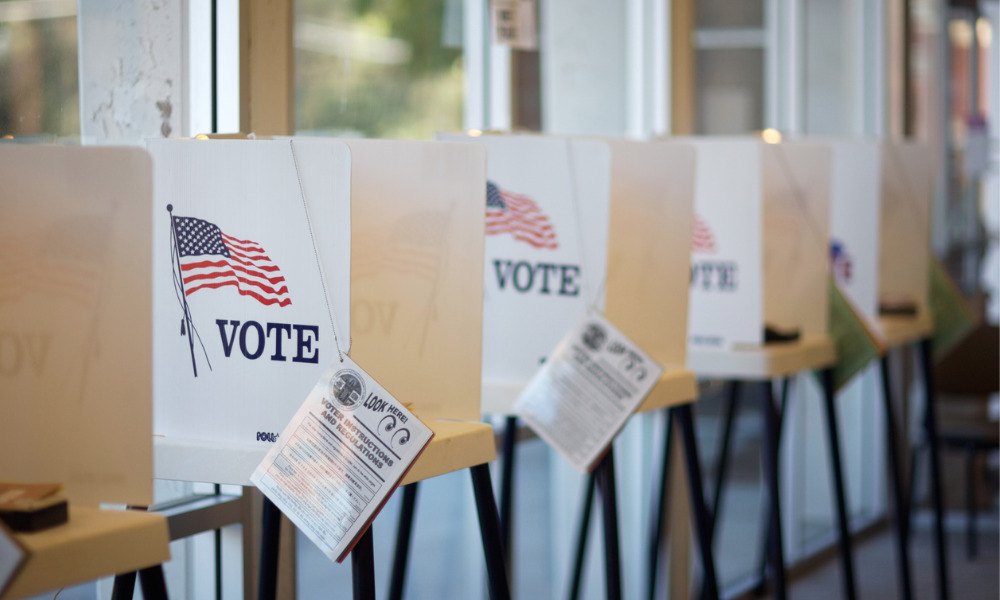Disputed outcome poses biggest threat to investors, according to CEO

There are many opinions over the biggest threat posed by the two U.S. election candidates. Another “debate” may be one of them, spreading COVID-19 most certainly is in the incumbent’s case. However, one CEO believes that the biggest risk to investors is a contested result and the subsequent “tumultuous” market volatility.
As a gruelling campaign, full of rancor and bitterness, heads to a climax, Democrat Joe Biden has a healthy lead in the national polls. We all know not to trust these anymore, though, and numerous outcomes are still possible. If the polls tighten and uncertain reigns, AGF’s CEO and CIO Kevin McCreadie said the potential for a disputed result increases.
He said: “President [Donald] Trump has made it clear time and again over the past few weeks that he believes mail-in ballots will lead to thousands of fraudulent votes being cast and said during the first presidential debate he would not concede the election if he believes the results have been manipulated.
“Of course, whether it comes to that will largely depend on how the vote shapes up down the stretch. For instance, Trump is more likely to dispute a slim margin of victory in Joe Biden’s favour than he is an outright landslide, but it’s unclear how wide that gap must be for the President to accept defeat without contention.
“Regardless, investors need to prepare for the possibility of an extended period of market volatility much like was the case when the Democrats contested the narrow election of President George W. Bush over Al Gore in 2000. In fact, this time could be even more tumultuous given how deeply divided the U.S. electorate is now compared to then.”
Eventually, though, there has to be a winner. Which septuagenarian will lead the “Land of the Free” and what outcome is better for the markets?
McCreadie said we can all safely rule out a Republican sweep of the White House, the House of Representatives and the Senate at this stage, adding that it’s too much of a long shot given the stranglehold the Democrats have on the House. However, a Democratic sweep is a very real possibility and “may be what scares markets most over the longer term”, although it might be more welcomed in the short term.
The American CEO said that immediately after the election, investors may take comfort in the massive fiscal stimulus many believe will result from a Democratic “Blue Wave” victory and rally markets higher because of it.
He said: “However, under this scenario, Biden would have a much easier time passing legislation to raise taxes just as he’s promised throughout the campaign. And, more than that, there is some worry that a sweep of this kind could lead to more radical left-leaning policies and/or regulations that would negatively impact sectors of the economy such as financials, for instance, or the fossil fuel industry and upset the current status quo which, rightly or wrongly, has greatly benefited many investors over the past four years.”
There are nuances to the possible results, of course. McCreadie thinks markets would be “relatively content” with the Democrats and Republicans continuing to share control in Washington. The best setup for investors might be a Biden victory combined with the Democrats keeping the House and the Republicans maintaining the Senate.
“This would provide the checks and balances required to alleviate some of the concerns associated with a potential Democratic sweep and could even quell some of the turmoil that has been a hallmark of Trump’s time in office,” he said.
“That said—and as already intimated—markets would also likely react positively in the event Trump is re-elected and the Democrats and Republicans hold their positions in Congress. However, that may not be the case if Trump wins re-election and the Democrats take both the House and the Senate.
“Such a scenario wouldn’t be deemed as bad as a Democratic sweep perhaps, but it could limit many of the pro-market tendencies of President Trump that markets have come to rely on. Depending on how wide a margin in the Senate the Democrats would have, it may enable both houses of Congress to override the President and enact less-than-market-friendly legislation.”



